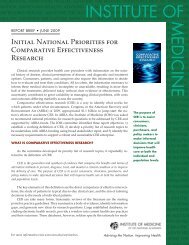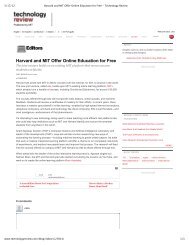Create successful ePaper yourself
Turn your PDF publications into a flip-book with our unique Google optimized e-Paper software.
Persistent challenges<br />
Pervasive corruption is a major impediment to Indonesia’s<br />
growth prospects. Bureaucratic bottlenecks, political<br />
interference, and judicial inefficiencies weigh on foreign<br />
investment and private sector participation in Indonesia.<br />
Of late, the government has initiated several anticorruption<br />
measures to improve governance. Several <strong>of</strong>fenders have<br />
been prosecuted and even jailed. The recent crackdown on<br />
corruption has also resulted in bureaucratic reluctance in<br />
spending money — even on worthwhile projects. Yet, new<br />
cases <strong>of</strong> tax evasion and bribery continue to be the order<br />
<strong>of</strong> the day.<br />
Corruption and bureaucratic delays also weigh on<br />
Indonesia’s competitiveness. Indonesia’s poor performance<br />
on global comparison metrics such as days required to start<br />
a business, cost to start a business, number <strong>of</strong> procedures,<br />
etc. are a significant deterrent to investors. Together, these<br />
factors result in less-than-favorable conditions for global<br />
manufacturers to invest in Indonesia. The country also<br />
fares poorly in terms <strong>of</strong> diversification <strong>of</strong> industries and a<br />
dearth <strong>of</strong> value-added industries. Furthermore, poor labor<br />
laws result in frequent labor union strikes, road blockages,<br />
and production disruptions. As a result, Indonesia’s labor<br />
advantage remains underutilized. The government faces<br />
the uphill task <strong>of</strong> strengthening institutions, ushering labor<br />
reforms, and altering Indonesia’s image in the eyes <strong>of</strong><br />
potential investors.<br />
Indonesia<br />
Moreover, the country lacks adequate infrastructure to<br />
support its growth aspirations. Infrastructure inadequacies<br />
result in connectivity breakdowns, adding to transportation<br />
and distribution costs and eventually higher inflation.<br />
Indonesia’s ports and airports are in need <strong>of</strong> improvement<br />
and cannot cater to high-capacity vessels. While<br />
the government has indicated its desire to remove infrastructural<br />
bottlenecks, whether the plan will be backed by<br />
credible action remains to be seen.<br />
A slowing world economy will definitely impact Indonesia’s<br />
growth prospects in one way or another. Slowing<br />
commodity prices could drive down export revenues<br />
and result in economic deceleration. However, domestic<br />
demand could partially <strong>of</strong>fset the decline in external<br />
demand. Growth in Indonesian tourism has been curtailed<br />
by instances <strong>of</strong> terrorism. Notwithstanding the downside,<br />
Indonesia’s economy has significant potential. Foreign<br />
investment could increase if investors make long-term<br />
investments by pursuing high returns in Indonesia.<br />
Furthermore, private investment will likely increase if<br />
authorities can establish legislative certainty. Overall, the<br />
economy is expected to grow by 6.5 percent in 2012.<br />
However, if the government succeeds in eliminating bottlenecks<br />
that hold back Indonesia’s growth, the economy<br />
could outperform consensus expectations.<br />
Geographies<br />
39











